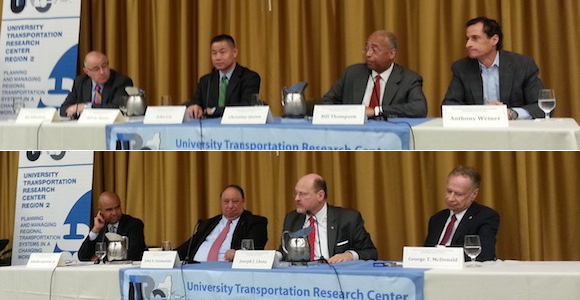
At a mayoral forum on transportation this morning, the first since a February event hosted by Transport Workers Union Local 100, eight candidates offered ideas on how they would improve the city's road and transit network. For the most part, the candidates were eager to support buses, quick to get agitated about bike lanes, and short on realistic ideas for how to fund their plans.
The forum, organized by the University Transportation Research Center, packed a room with over 200 students and transportation professionals at Baruch College, with questions posed to the candidates by a lineup of experts. There were two panels: the Republican and independent candidates -- Adolfo Carrión, John Catsimatidis, Joe Lhota, and George McDonald -- followed Democratic candidates Sal Albanese, John Liu, Bill Thompson, and Anthony Weiner. Bill de Blasio and Christine Quinn did not show, leaving empty seats behind their name tags.
Many of the candidates wanted more mayoral control over the city's transit network, if not an outright transfer of responsibility from the state. While city control of subways and buses is unlikely, Lhota said, "that doesn't mean we shouldn't bring it up." Even without full control, he said, the mayor can exert influence through MTA board appointments, providing operating subsidies, and adding bus lanes.
The candidates all cited the need to expand the bus network, particularly Select Bus Service and express buses; many of them also spoke highly of ferries, which require substantial subsidies.
Albanese, Carrión, and McDonald all endorsed "Gridlock" Sam Schwartz's "fair toll" plan, which would increase or add bridge tolls where there are transit options while cutting tolls where transit is scarcer. Albanese said he would split revenue from the toll plan: Three-quarters of it would go to transit operations, with the goal of reducing the pressure for fare hikes, and a quarter would go to capital investment. McDonald, citing the MTA's growing operating budget, driven by labor and debt costs, said he would dedicate all of the program's revenue to capital investments.
Catsimatidis said that he opposes any proposal that would add or increase tolls, while Thompson repeated his long-standing call for assessing vehicle registration fees by weight and reinstating the commuter tax, which would be dedicated exclusively to transit. Liu, while calling a return of the commuter tax unrealistic, said Congress should allocate more funds to transit.
Albanese and Carrión both said they would create a national coalition of mayors to advocate for more federal investment in transit, using Bloomberg's Mayors Against Illegal Guns as a model.
Liu also said the city should use revenue from real estate development in the outer boroughs to finance bus service expansion, citing the Hudson Yards 7 train extension as a successful example of this type of funding mechanism. Lhota also spoke favorably of the 7 train extension, and called for more tax increment financing. (With real estate tax revenue falling below expectations at Hudson Yards, city tax dollars are now making up for shortfall.)
Anthony Weiner did not discuss funding mechanisms for transit investment.
In his question to the candidates, Transportation Alternatives Executive Director Paul Steely White noted that bike-share and bike lanes enjoy higher approval ratings than the mayoral candidates, a fact that Weiner mocked. "I actually have some polling here that says that a proposal to give rocket packs to every citizen to fly to work has 90 percent, so congratulations on your polling," he said, before reiterating that while he calls himself "a pro-bike Democrat" and uses Citi Bike, he believes "there are good bike lanes and bad bike lanes." Weiner once again claimed that the Broadway bike lane near his apartment hinders commercial deliveries and impedes emergency response.
Liu said he is an "avid cyclist," but claimed that bike lanes were only really necessary in Manhattan. "The city is still insisting on a one-size fits all model," he said. "The hazards from trucks and buses and cars are not as great as they are in Manhattan."
Liu, Thompson, and Weiner all couched their opposition to bike lanes in objections to the planning process. Weiner said that the administration "has been dripping with condescension" when it works with communities on bike lanes. "It comes back to making sure that communities are involved in the discussion," Thompson said.
Once again, Sal Albanese was the only Democrat to offer a reality check to the rest of the field. "All the bike lanes that have been put into place have been put into place with community input," Albanese said. "The bottom line is that it's great for the city." Carrión and McDonald also offered full-throated endorsements of bike lanes.
The forum included its fair share of questionable ideas from the candidates. Lhota proposed building park-and-ride facilities at the ends of subway lines so suburbanites could park and pay a $2.50 subway fare, instead of using Long Island Rail Road or Metro-North. He also championed extending subway lines in the outer boroughs, including a new subway tunnel from Bay Ridge to Staten Island, while Catsimatidis said the city should consider a monorail along the Long Island Expressway.





